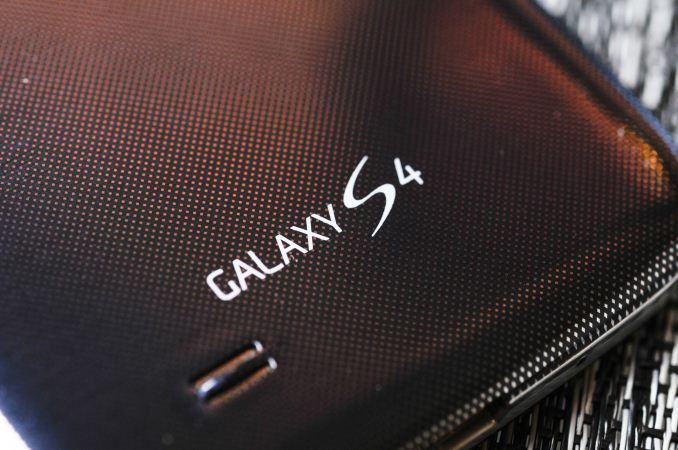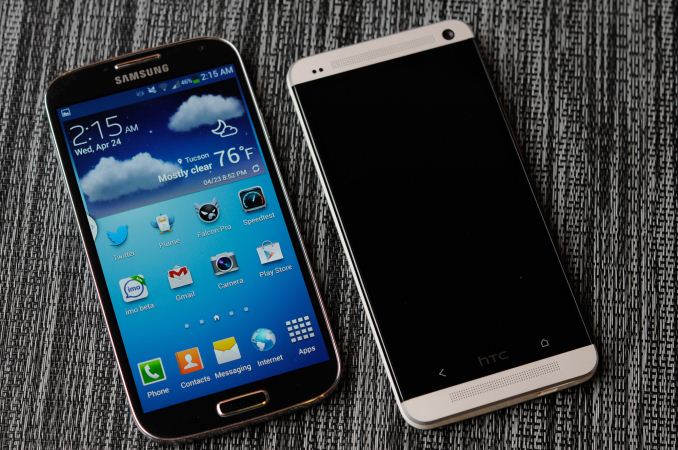Samsung Galaxy S 4 Review - Part 1
by Brian Klug on April 24, 2013 12:01 AM ESTFinal Words
Samsung has done a tremendous job creating a global following not only for its brand, but also for its software. In studying Samsung and its devices it becomes quite clear that although many enthusiasts yearn for pure, unadulterated Android, there are seemingly big pockets of the market who have grown used to (and maybe even desire?) Samsung's TouchWiz user experience. It really is a very clever strategy on Samsung's part. If you deliver products that your users appreciate, and deliver a uniquely different user interface at the same time, you begin to create an appreciation for that user interface as well. All of this flies in the face of what we as reviewers normally seem to prefer, but Samsung's success is proof of the fact that not everyone absolutely detests OEM customized Android.
Samsung's existing user base is likely the easiest to talk to about the Galaxy S 4. Compared to any previous Galaxy S device, the SGS4 is a clear step forward in all of the right areas. The display is higher resolution, the SoC is significantly faster, there's better WiFi (and connectivity depending on what generation of Galaxy S you're talking about) and obviously the Galaxy S 4 runs the absolute latest version of Android. Even on the camera side, Samsung has improved imaging performance over the Galaxy S 3 this generation thanks to its use of a wider aperture lens system. If you're a happy owner of a Samsung Galaxy S/S2/S3, you'll likely be a happy owner of a Galaxy S 4.
It's when you compare the Galaxy S 4 to its chief technical competitor, the HTC One, that the discussion becomes more complicated. HTC and Samsung take very different approaches to nearly every aspect of their flagship smartphones. Whether it's display (LCD vs. Super AMOLED), camera (low light vs. well lit performance), or software (subtle Sense 5 or feature filled TouchWiz), you couldn't pick two more different players in the Android space. So which is better?
It really depends on what you value more. The One's camera delivers better low light performance, while the Galaxy S 4's camera delivers better performance in well lit (e.g. outdoor) scenarios. The One's software customizations are definitely more subtle and out of your way, while Samsung's approach is much more feature overload and in your face. It's difficult to say for sure given our Sprint review unit, but HTC likely gets the slight edge in battery life based on our results here today (although these two devices can be close competitors depending on the workload). Samsung does integrate the faster SoC, despite both the Galaxy S 4 and HTC One shipping the same Snapdragon 600 platform. Samsung and HTC remain on opposite sides of the removable battery/microSD fence, if those two things matter to you then Samsung is the obvious choice. Finally there's a question of how much you value/desire an all-metal smartphone. For some, Samsung's choice in materials is going to continue to be a very big issue.
At the end of the day, the Galaxy S 4 is an evolution of the Galaxy S 3 in pretty much all of the areas you'd expect it to be. Whether or not that's what you wanted in a new Android smartphone is going to vary from one person to the next. The good news is that you at least have a choice.












335 Comments
View All Comments
blue_urban_sky - Wednesday, April 24, 2013 - link
I am very interested in the sock browser you mention."I find it difficult to hover my finger over the screen without touching it, but in the gallery and sock browser it is admittedly sometimes useful."
wenugopal - Wednesday, April 24, 2013 - link
Just curious, isn't galaxy s4 using LPDDR3 RAM, as opposed to LPDDR2 which is used in HTC One ? Hence, higher speeds ?Brian Klug - Wednesday, April 24, 2013 - link
Absolutely true, there's more to it than that though for things like CPU performance.-Brian
scaramoosh - Wednesday, April 24, 2013 - link
I have big doubts that DDR2 and 3 makes much difference, we never see much of a difference on the PC in day to day use, only benchmarks.B3an - Wednesday, April 24, 2013 - link
DDR3 is significantly faster than DDR2 on PC now. You can definitely notice a difference without benchmarks depending on what you're doing. Stupid comparison though because phones are too different.UpSpin - Wednesday, April 24, 2013 - link
because the RAM gets used for both CPU and GPU I think the upgrade to DDR3 makes a noticable difference, at least for the GPU. (the same way dual channel gives Intel IGP performance a boost compared to single channel)Mithos - Wednesday, April 24, 2013 - link
Man, I DO value removable battery as I'm the type that likes buying an extended battery for business trips. I rely on the GPS, constant mail checking and of course calls.But all that aside, I prefer the construction and UI the HTC One presents, yet it does not have expandable battery.
Ohhhh cruel world and it's first world problems.
Nice review, thank you for the hard work.
Gigaplex - Wednesday, April 24, 2013 - link
What's stopping you from getting a portable battery powered phone charger?Toss3 - Wednesday, April 24, 2013 - link
Removable battery does not just limit you to buying a separate one, but enables you to buy a 4500mAh after market battery that lasts two full days without charging. You cannot do that with the HTC One.UpSpin - Wednesday, April 24, 2013 - link
but this dramatically increases the size of the smartphone. I would rather buy a battery powered smartphone charger, which I can store in a bag or jacket and keep the already large smartphone comfortably sized. It's already thin, no question, but it's wide and long, and if it becomes thicker it becomes harder to use and to store it in a pocket.